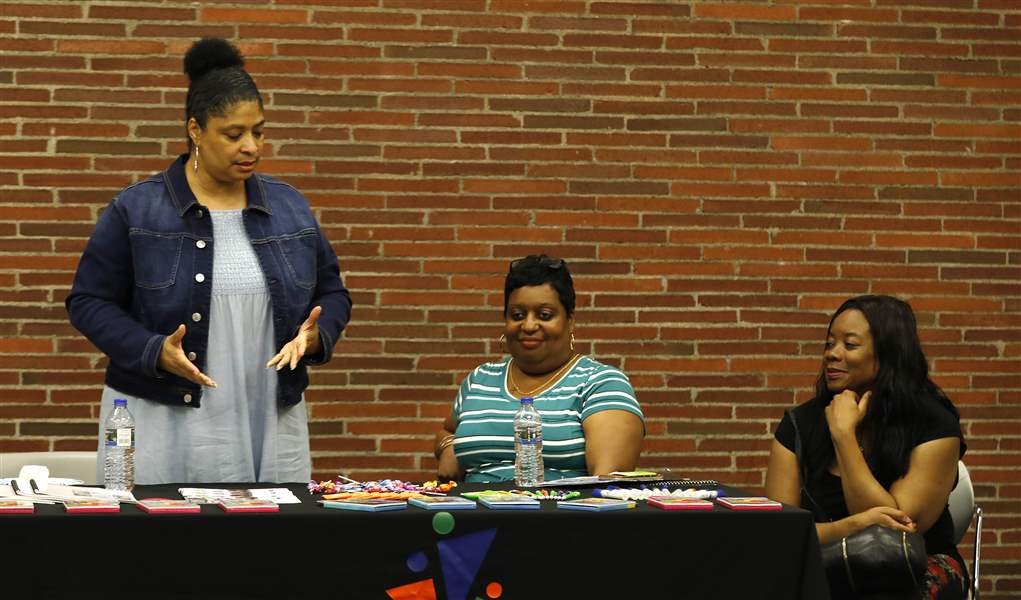As opioid epidemic worsens, more grandparents raise grandchildren
July 2, 2018

Sherry Dunn, left, Vonda Williams, center, and Melanie Webb, right, of Lucas County Children Services introduce themselves during a seminar for grandparents raising their grandchild at Kent Library on Tuesday, June 26.THE BLADE/SAMANTHA MADAR
 By Hailey Fuchs | BLADE STAFF WRITER
By Hailey Fuchs | BLADE STAFF WRITER
Presley, 5, and Ariana, 9, are living with no lights, gas, or water, said their grandmother Betty Garcia. Their parents are both addicted to heroin. Their mother tried to stop the girls from telling their grandmother, but Ms. Garcia remembered the signs from childhood friends whose parents were dependent on drugs.
"They tell me how they do it. They seen' em," Ms. Garcia said. "They slept in a car. They tell me everything."
Now, Ms. Garcia, a mother of seven and grandmother of 15, is looking at her options to pursue custody.
"I need to find out what I can do to get them out the situation that they're in," she said.
She is already caring for two other grandchildren, Savannah, 10, and Junior, 7. Savannah and Junior's father was deported to Mexico earlier this year, and their mother, who lives in Napoleon, is juggling a 1-year-old baby and a 15-year-old. Savannah and Junior will go back to their mother in the fall when she and the baby's father move back to the area, but Savannah, still grieving her father's deportation, wants to stay, Ms. Garcia said.
In more than 10 percent of Ohio households, grandparents are the primarily caregivers for their grandchildren. And Sheila Gibbs, Lucas County Children Services family services manager, said upward of 60 percent of the 700 open child services cases result in children in the care of a relative.
Now, cases like that of Presley and Ariana, where a parent's drug dependency leaves children without an obvious guardian, are becoming all the more common. If the opioid epidemic continues at this rate, the number of children in Ohio's foster system will grow to 20,000 by 2020, according to a 2017 report from the Public Children Services Association of Ohio.
On a recent day, Ms. Garcia's son had taken Junior for the night. She came with her neighbor, Winnifred Williams, to the Grandparent Project at Kent Library. The series, founded in 2014, offers resource information sessions and seminars on finance, emotional and behavioral issues, education, and legal issues to grandparents raising grandchildren.
Ms. Williams has been caring for Loyal, 11, since the girl was 5. She and her son take shifts working and spending time with Loyal to keep her occupied.
"She still feels like her mother doesn't care about her," she said. "I want her to spend time with her mother so that she can understand why she's here."
"Loyal's mother was juggling several children and multiple jobs when her children were taken by child services for neglect. The other kids went to their father's, but at the time, Loyal's father did not have a place of his own, so Ms. Williams was given custody, she said. Now, all three live under the same roof.
Being a grandparent-turned-parent can be "cool," Ms. Williams said, adding that she's learned a lot about technology and cell phones. But it offers its own challenges, she said: Loyal never returns home to her parents.
"If you don't have any kids to raise and all of a sudden you have a grandkid, it makes it difficult," she said. "You go from being a grandparent to a single mother again."
At times, grandparents relinquish the kids to child services when difficulties become insurmountable, sending those kids into the already overwhelmed foster system, said Sherry Dunn, foster parent recruitment supervisor.
The Grandparent Project is about removing "the red tape" on those obstacles, said project co-director Andrea Hudak.
Over slices of pizza, grandparents and other relatives discuss shared challenges of being an elderly second-round parent, while library staff provide child care and dinner, Ms. Hudak said. She added that, among the stories she has heard, 90 percent have been impacted by drug addiction.
Ms. Hudak recalled one woman in her 70s, close to "throwing in the towel," raising an infant, toddler, and a first-grader. She was struggling to make the mile and a half trek to school each day with all of her children, but she learned at the session that busing rules on distance did not apply to families with grandparents raising grandchildren - her first-grader could be bused to school, Ms. Hudak said.
According to a report from the Ohio Association of Community Action Agencies, 93,394 grandparents in the state were responsible for their grandchildren in 2015. Almost a quarter lived in poverty, and more than 40 percent live in a household where the grandchild's parent is not present, often referred to as a "skipped-generation family."
Retired seniors who have become a primary caregiver have the option to return to work or continue to deplete their savings. At a news conference last week, U.S. Sen. Sherrod Brown (D., Ohio) said he has proposed a federal task force to support grandparents raising grandchildren by aggregating and sharing resources. The task force's bill, Supporting Grandparents Raising Grandchildren Act, is headed to the President's desk after receiving bipartisan support, he said.
"Among the victims of the opioid epidemic are the kids whose parents are struggling with addiction or whose parents have been taken far too soon by this public health crisis," Mr. Brown said in a statement. "We need to learn more about the challenges facing grandparents and other relatives in Ohio who have stepped up as caregivers, so we can support them as they raise these children."
But before Ms. Garcia can even be a caregiver of Presley and Ariana, child protective services must first conduct an investigation to determine if and how the children are endangered, said Gregory Janson, Ohio University professor of child and family studies. The process could be a few days, but if the parents contest, it could draw on a lot longer, he added.
The situation isn't ideal, Ms. Garcia said, but she doesn't have a choice.
"I know it's not what I want to do, but I have to just to save them...from being in the [foster] system. I don't want 'em to be."
« Back to News
